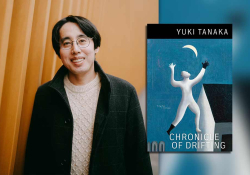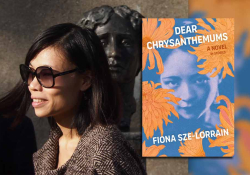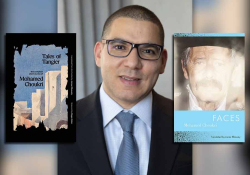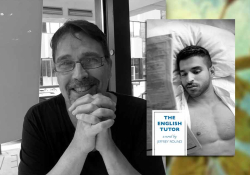A Quiet Author’s Written Rebellion: An Interview with Ananda Devi
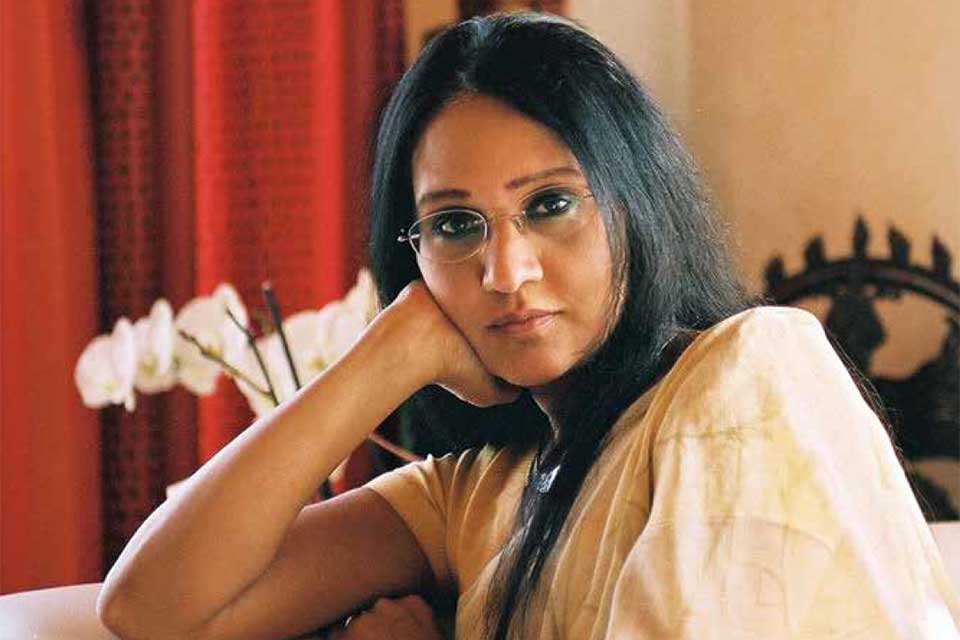
Ananda Devi is a noted francophone poet, writer, ethnologist, translator, and occasional scriptwriter for the movie adaptations to her short stories and novels. Born in Mauritius, a tiny island in the Indian Ocean and the setting for most of her works, she is considered one of the country’s major writers, although she writes in French and has been living in France for more than twenty years. Owing to its colonial past, Mauritius is home to many languages and communities. A few of the dominant languages are Creole for everyday life, English for administrative matters, and French for cultural life.
Reading Ananda Devi is like receiving a stunningly poetic punch on the subject of tragic lives in a violent environment. Stifling religious and social rules constrict the lives of the weakest beings in society, primarily women and children. Rebellious characters wishing to live their lives by their own standards are met with violent abuse or exclusion.
When I met Ananda Devi at the Assises Internationales du Roman de Lyon (AIR) festival in June 2012, I found myself talking to a very quiet, graceful woman with a shy smile, a stark contrast to the rebellious, passionate women she conjures in her novels. She had published in 2011 a semiautobiographical type of confession, Les hommes qui me parlent, revealing how men who were important to her had considered her place in the family, her work, her motives for writing, how a writer friend in time of doubt had pushed her to keep creating her forceful stories, and how her heroines themselves persuaded her to “free herself.”
Dinah Assouline Stillman: At what moment in your life did you feel drawn to write?
Ananda Devi: It started with reading. When I was a young child, I read many tales and poems. my parents loved books. My father used to read poems to us, and pages and pages of tales and novels. Each time he went to the capital city for his business, he would come back home with many books. I was an avid reader, and I had started to write poems as early as age seven or eight. And very naturally, at the age of twelve, I started writing longer texts, even a first novel of fifty pages, not having any inkling then that it would later become my principal activity. my teachers noticed my aptitude and encouraged me. I was thirteen when I wrote Les vagues vertes de la solitude (Solitude’s green waves), which was set in Scotland, a country I had never set foot in! At fifteen, I participated in a short-story contest, and mine got the first prize—it was published and even read on the radio. At nineteen, I had published my first collection of short stories. I have never stopped writing since then.
Stillman: In view of the recurring themes in your novels, one might wonder if you do not purposely make yourself unhappy to be in the mood to write your stories.
Devi: No, there is no need for me to; there are enough situations that speak to me. I am attracted to the distress I see or hear about. The stories my mother and grandmother used to tell me about the lives of generations of women before me were transmissions of the voices and fates of women that moved me. Already in my first writings, those themes were recurrent. “la cité attlee,” a short story I had written at fifteen, is the story of a very poor girl who loves writing. Her mother is a cleaning lady, her father a violent alcoholic. When her mother dies giving birth to an umpteenth child, the girl tears up her notebooks. She understands she must forget about her dreams.
Stillman: In your latest book, Les hommes qui me parlent, you write: “Each book is an admission of powerlessness.” Is that true?
Devi: Yes. But fortunately, one still goes on writing! And painfully so, especially for this last book, because of my questioning.
Stillman: Why do you need to convey all the characters’ thoughts in a novel through the first person?
Devi: I need to find the voice of the narrator. The stories in themselves are not new, but the key to the character who is going to tell the story is his voice.
Stillman: Do you identify with all the characters whose voice you espouse, even the most monstrous? I am thinking of Le sari vert in particular.
Devi: Well, yes, during the writing period, even the demonic old man in Sari lived inside me. This is how I best managed to understand him, to reveal his cruelty against the three women he tormented. In fact, it is a story that I kept within me for a long time, but which I could not write as long as I could not manage to find the voice. once the idea of narrating it from the man’s point of view came to me, the novel took no time to be finished.
Stillman: Why do you almost exclusively write about the most powerless beings in the world, children and women abused in a patriarchal and violent environment? Do you feel more like the rebellious Eve or the well-behaved Savita in Ève de ses décombres?
Devi: Neither one nor the other. In Rue la Poudrière, an earlier novel, the principal character, Paule, was very much like Eve, as both sell their bodies, but Paule saw herself as a victim, contrary to Eve, who was independent and rebellious. My subsequent heroines are freer. There is more hope for them at the end of the stories. Subhadra’s son in Indian Tango is at first critical of his mother, but later he is the only one to understand her when she asserts her freedom. As the writer, I let all those characters go through my mind and my body—I am not them, or rather not just one of them, but a little of them all. My need to go toward the most destitute comes from the necessity of being concerned for my characters, to push them to their farthest limits, until they understand who they are. I feel fascinated by the question of researching why man is capable of the greatest generosity as well as the fiercest cruelty, why his behavior can switch from altruism to violence. What is the trigger toward one or the other?
As the writer, I let all those characters go through my mind and my body—I am not them, or rather not just one of them, but a little of them all. My need to go toward the most destitute comes from the necessity of being concerned for my characters, to push them to their farthest limits, until they understand who they are.
Stillman: Do you feel a chronic mistrust of men? Except for the young men like Sad and Clélio in Ève de ses décombres, men seldom seem to be positive characters. Do they become tyrants as soon as they marry?
Devi: I think it is a question of probability, like in Sari. When the young husband acts out for the first time, he feels such a climax of power that he will do it again, becoming more and more violent with his wife, and later with his daughter. It is very rare that the husband-wife relationship is equal in patriarchal societies. Unfortunately, violence can also be transmitted by women.
For example, in my novel Pagli, the old women are furies who want to keep their social conventions alive by using against her the very violence they were the victims of. They prefer to maintain the status quo by submitting to tradition, and would not accept that other women could be freer. Pagli transgresses the religious and social order in her Indian community by mocking her arranged marriage and by having a man named Zil for a lover, who is considered inferior because he is a creole.
To go back to men, my son criticized me because I had not gone further in my depictions of reality. While my tales were denouncing sufferings, betrayals, and a society with antiquated and cruel values, for him I had “stayed in my bubble,” in the shelter of my family instead of the reality I depict in my novels.
Stillman: You also write in Les hommes qui me parlent, “Entre artiste et autiste, il n’y a qu’une lettre” (between artist and autist there is only one letter). Would you mind clarifying that?
Devi: I think writers have dual or multiple personalities, but it is not pathological for all of them. Writing is what saves us. For example, the silence in my father’s family, which I have inherited, was a problem for me for a long time: my extreme shyness could prevent me from communicating, or even functioning, in society. On the contrary, art liberates.
I think writers have dual or multiple personalities, but it is not pathological for all of them. Writing is what saves us.
Stillman: Do you mean it is what you prefer, to write rather than to speak, or the “see and not be seen” attitude, which you recall in Les hommes, when you waited for long hours in your father’s car while he was tending to his business appointments in the big city, Port Louis? What is your role as a writer?
Devi: To see without being seen allows the artist to observe in order to write. I was fifteen then. It was the independence period, when Mauritians were filled with pride, but inside my father’s Beetle, behind the window while I was waiting for him, I could see the reality in Port Louis, the intense poverty of the people living in neighborhoods the government was trying to hide with the same false tourist image as before. What I saw most in those unfortunate people, at grips with unemployment and violence, was their silence, the silence that surrounded their conditions. My first novel was about a prostitute. Nobody talked about them at the time. People only talked about the mythical past of the island. Since then, I have dug relentlessly inside the unspoken (les non-dits).
Stillman: Speaking of clichés, some of your descriptions of the sea in your novels really do not recall the paradise suggested by the tourist brochures about Mauritius. Let me quote you: “The sea will never be blue, it will be the enraged and dangerous sea of my dreams, the fisherman’s drowning.”
Devi: Yes, the sea can be turquoise blue and still drown people. Paradise does not exist.
Stillman: Does Troumaron, Port Louis’s destitute neighborhood—the name of which evokes a sewer—the setting for the tragic quartet of teenagers in Ève de ses décombres, exist?
Devi: It does, but not under this name. These are neighborhoods that date back to the slaves’ past, in which poverty is endemic. The youths from the real neighborhood appear in the film, which was made after the novel, Les enfants de Troumaron. They spontaneously came to us to play the parts of the angry and desperate teenagers in the film and played the characters with much unaffectedness. Since then, they have evolved. The film, and their own openness to change, gave them the opportunity of going out of their milieu, to see in the world something other than violence.
Stillman: In Les hommes, you also write: “All the women in my books told me: free yourself! It was a message I sent to myself, but I would not listen to them.” Did you finally listen to it?
Devi: Absolutely. it is necessary to break the molds. In all my novels, I write about women locked in traditions and conventions that stifle them. In my last book, I write that I confined myself to social roles I could have done away with much earlier. But the fact is, I did not realize it because my inner life was so rich.
Stillman: Also, in the same book, you describe yourself as a “sensorial writer.” What do you mean by that?
Devi: I could not be other than sensorial. Initially, my writing is emotional and passionate. Even exploring the dark can be done through the senses. I feel the need to create an entire world through the senses so that the reader will physically feel it. This is why I endeavor to describe smells, dust, the touch of the wind, a drop of water on a shoulder, honey dripping on the skin.
Stillman: True, in Indian Tango, Subhadra, this respectable New Delhi wife en route to a pilgrimage signaling the death of her femininity, is brought back to her bodily senses with desires she thought had long disappeared: The descriptions of the sitar she covets, the feelings the Argentinean tango music she hears for the first time provoke in her, the appearance of erotic discoveries as much as the tabooed encounters. And New Delhi in monsoon season feels like another sensuous character all by itself.
Devi: New Delhi is indeed part and parcel of the characters in this novel. In my next novel, set in London, the city also plays an important part in the plot. But one changes from heat to cold into a kind of congealment reminiscent of the end of time, in which decaying corpses change to be born again.
Stillman: Is this sentence in Les hommes, “A sure sign one does not live any longer is when one does not fantasize any longer,” applicable to Subhadra?
Devi: Yes, that’s right. In traditional societies, female desire does not exist. Male fantasies in those societies are that women do not fantasize about men other than their husbands.
Stillman: That is why Indian Tango is such a transgression. Subhadra not only rediscovers her body’s senses through pleasure with an unknown person, but that person is a woman, an absolute taboo for her community. Do you think just being a female is seductive, as when you state, again in Les Hommes, “Being a woman is being into seduction”?
Devi: Yes, and this is what is so contradictory: Traditional men cannot bear the thought that their wives could be seductive. Once husbands have been seduced by their wives, they would like their wives to never seduce again. A woman who seduces is “like an open door,” an invitation to rape. It is the trap of sexual harassment: a woman in a short dress provokes in those men the desire to force her. Her power of seduction is frightful: She is considered a witch. Aren’t we all?
June 2012
Reading Ananda Devi
by Dinah Assouline Stillman
The first Devi novel I read, Ève de ses décombres (2006 RFO Prize and Prix des Cinq Continents), struck me from the opening to the final sentence with the wrenching voices of wild teenagers expressing their rage and anger at living in the No Future environment of their poor, derelict neighborhood. Pagli (2001), set in earlier times in the Mauritian past, is ablaze with the furious desire for life of a defiant heroine battling, with tragic consequences, the stubborn narrowness of social and religious prejudices. La vie de Joséphin le fou (2003) poignantly reveals through the narrator’s voice the abuses he suffered as a child. The consequences of his battered childhood make of him a monster excluded from his community and the perpetrator of crimes he never intends.
In spite of bleak intrigues, rife with outcast female principal characters, Devi’s novels are read in a single uninterrupted breath, and her dazzling poetical descriptions remain forever planted in the reader’s mind. Flickers of hope emerge in the later novels for the defiant heroines, as in Tango Indien (2010; Eng. Indian Tango, 2011) and Le sari vert (2010; The green sari). For example, Indian Tango, set in New Delhi, conjures two very different women—one a visiting writer whose inspiration has dried up, the other a middle-aged housewife who does not expect much from her marriage and her monotonous life—and weaves a breathtaking tale of taboo sex between the two. We know nothing about the mysterious writer except for her obsession with following this woman with the intention of changing her life forever. What we learn about the other woman, Subhadra, is a dire future prospect prepared for her by her tyrannical live-in mother-in-law: a pilgrimage to definitely renounce her femininity as she approaches menopause. Humor darts here and there with sharp ironic descriptions of the elderly woman’s attitudes when she constantly reminds her daughter-in-law of all her duties toward her son and herself. The writer stalks Subhadra for a month, whose walks invariably take her to a music shop, where she yearns for the sitar behind its window, an instrument she studied before she married decades ago, when she was a happy child. The sitar, which makes her dream, the delicious discovery of a languorous Argentine tango overheard through the walls, and the daily strolls in a dripping-wet city during the monsoon season punctuate each of Subhadra’s escapes from her domestic chores until the sexual encounter that will lead to an unexpected conclusion.
In Le sari vert, the narrator, an old and manipulative man on his deathbed, tries to justify his criminal treatment of three generations of women: the young wife he abused until she died, the daughter he relentlessly tortured until she married, and the granddaughter he tried to subvert until he died. His granddaughter’s defiance and independence represent hope for women to break away from oppressive, patriarchal societies. To his final cynical explanation that his violence was nothing less than “love,” she replies: “No. There is only one word for violence, it is violence!”
Editorial note: First published in the May 2013 issue of WLT. Devi is among the francophone writers who signed the manifesto “Pour une littérature-monde en Français” in 2007; see “Toward a ‘World-Literature’ in French,” trans. Daniel Simon, WLT, March–April 2009, 54–56. Since this interview was first published, Ève de ses décombres has appeared as Eve Out of Her Ruins, translated by Jeffrey Zuckerman (Deep Vellum, 2016), and was listed among the hundred best contemporary novels in translation by women writers (see WLT, Nov. 2016).


